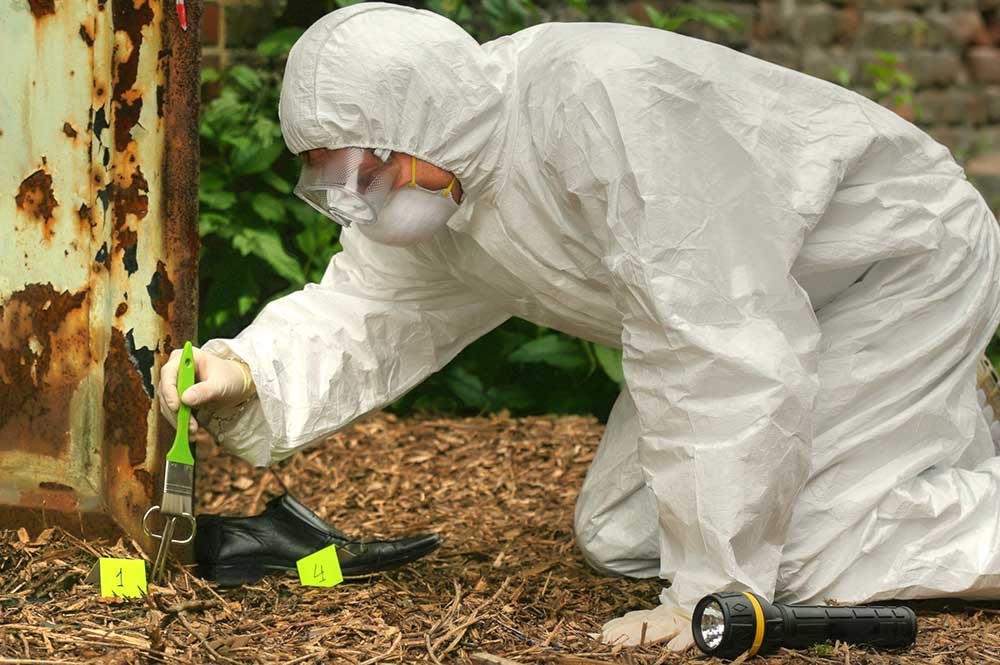Disclaimer: The information on our website is provided for general information purposes only. We make no representations or warranties of any kind, express or implied, about the completeness, accuracy, reliability, suitability or availability with respect to the website or the information contained on our website for any purpose. Any reliance on such information is therefore strictly at your own risk and we are not liable for any damages or losses arising out of or resulting from your reliance on any information contained on our website.
A forensic science technician analyzes and collects evidence that is involved with criminal investigations. Some work directly at crime scene sites, whereas others may only work in the laboratory, dissecting the collected information. A forensic science technician tests evidence from crime scenes using physical, chemical, and biological analysis.
Watch a video to learn what a forensic science technician does:
How to Become a Forensic Science Technician
Typically a forensic science technician has a bachelors degree in science. Degrees such as biology or chemistry are common. However, you can find schools offering forensic science degrees. Coursework should include toxicology, pathology, or DNA studies. Students taking general natural science programs should consider any classes closely related to forensic science. The American Academy of Forensic Sciences (link opens in a new tab) has a list of schools that offer forensic science programs. This website also has additional resources that can help further exploration of the Forensic Science industry.
Many Forensic Science Technician opt to who work as police officers and have also met educational requirements necessary for admittance into a police academy. For more information on how to become a police officer, go to our job description for Police Officers (Cop).
Entry-level forensic science technicians receive on-the-job training and usually work under a seasoned investigator. During this training, you will learn the proper procedures and methods for collecting and documenting evidence in addition to laboratory specialties. The training length can vary by specialty, but is usually 10-12 months long.
Certifications and licenses are not typically necessary for entry into the occupation. However, credentials can vary from state to state due to different standards and regulations in each state. Though not required, there are a variety of licenses and certifications available that one can earn. Check out your local organizations for more information on this.
Job Description of a Forensic Science Technician
A forensic science technician’s primary job is to aid in criminal investigations by collecting evidence at a crime scene or evaluating evidence in a laboratory. Forensic science technicians collect physical evidence that may include but are not limited to taking pictures, sketching observations, and collecting bodily fluids, weapons, or fingerprints. They must be very observant and notice the positioning of the evidence, location, record, and catalog of all information. This allows those investigating the crime scene to reference evidence and submit it to the proper authorities.
Forensic science technicians would try to connect evidence between the suspects and the criminal activity by referring to their analysis. They may be required to reconstruct a crime scene to form a more accurate idea of the crime committed. They often have consultations with other professionals in a related field like odontology and toxicology. All forensic science technicians develop reports that detail their findings and investigative methods. They are often called to present and explain these reports to lawyers, detectives, and other law enforcement officials. At times, a forensic science technician may have to testify in court as well.
Crime scene investigators have irregular hours that can vary from days, evenings, or nights. Overtime is common because they must always be available to collect or analyze evidence when a crime occurs. However, technicians working in the laboratories often have regular hours.
Forensic Science Technician Career Video Transcript
In popular media, the work of forensic science technicians seems fast-paced and exciting. In reality, the work is slow and painstaking but still extremely important. Forensic science technicians often specialize in either crime scene investigation or laboratory analysis.
At a crime scene, they record observations, take photos, and collect evidence. In the lab, they perform tests on weapons and substances such as fiber, hair, and tissue to determine a connection to the crime and to a suspect. They also write reports to document their findings and the laboratory techniques used. Some forensic technicians specialize in particular areas such as fingerprinting, DNA, handwriting analysis, or ballistics. Digital forensics analysts specialize in computer-based crimes. They collect and analyze data to expose electronic fraud, scams, and identity theft.
Most forensic science technicians work for police departments, crime labs, morgues, and coroners’ offices. They may work outside in all types of weather, and divide their time between labs and offices. While they gain expertise and deductive skills from on-the-job experience, forensic science technicians typically need to start with at least a bachelor’s degree in chemistry, biology, or forensic science. Forensic science technicians might be called upon to testify as expert witnesses in court. Their evidence and testimony can help send the guilty to prison or clear the innocent.
Article Citations
Bureau of Labor Statistics, U.S. Department of Labor, Occupational Outlook Handbook, Forensic Science Technicians.
National Center for O*NET Development. 19-4092.00. O*NET OnLine.
The career video is in the public domain from the U. S. Department of Labor, Employment and Training Administration.

